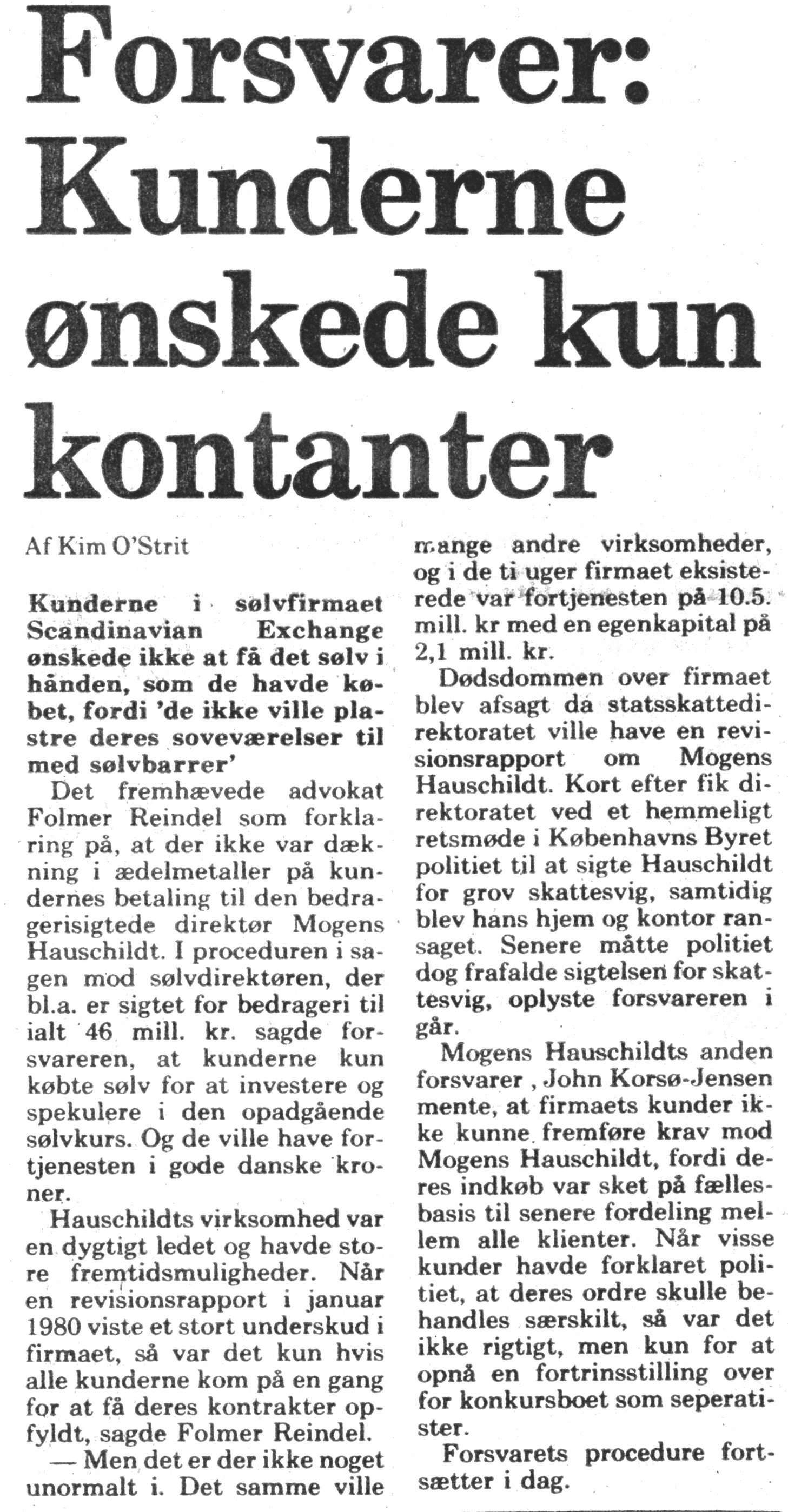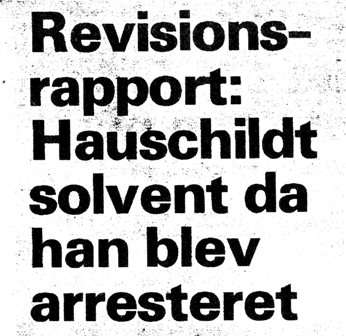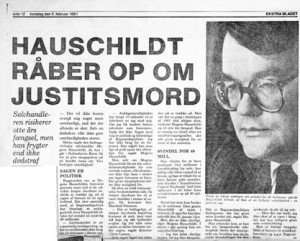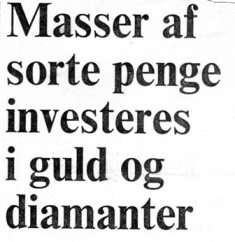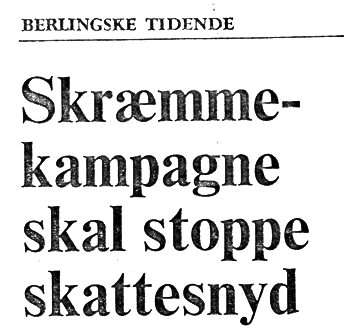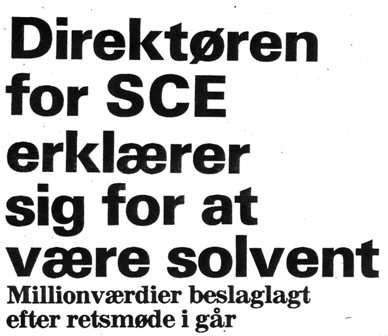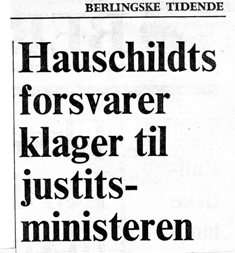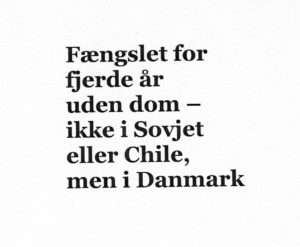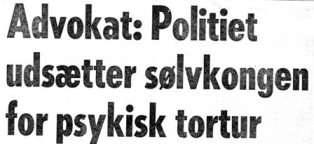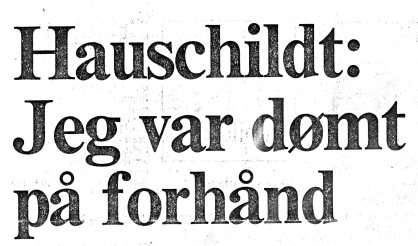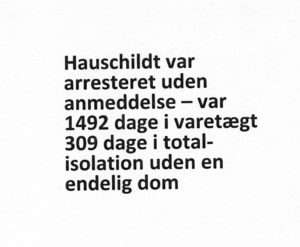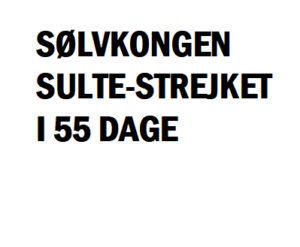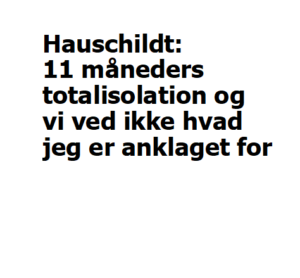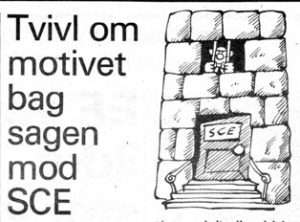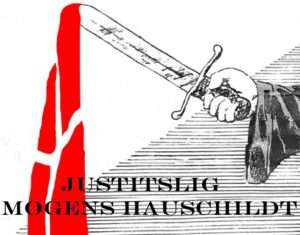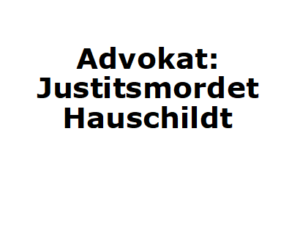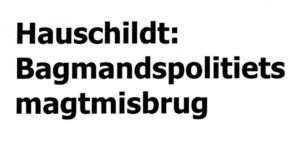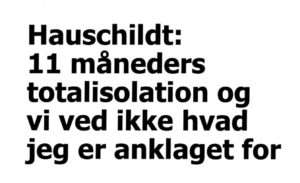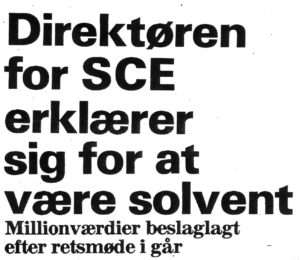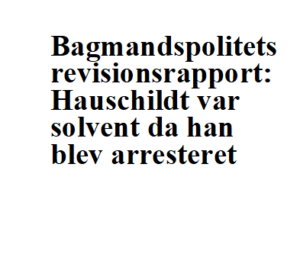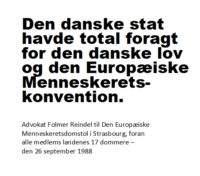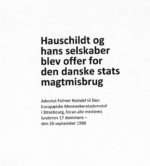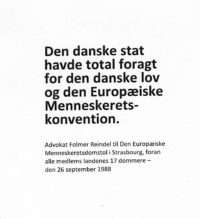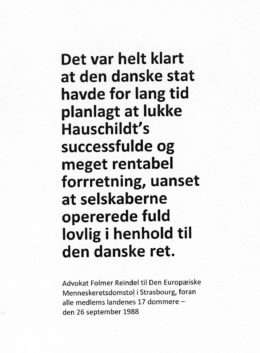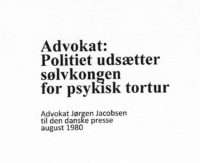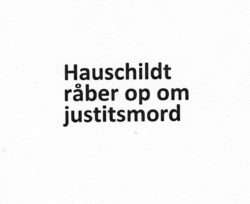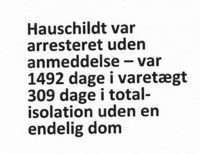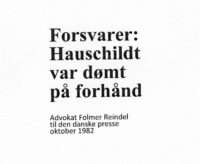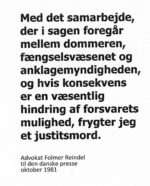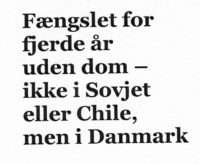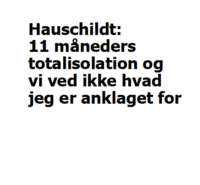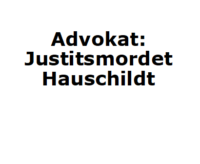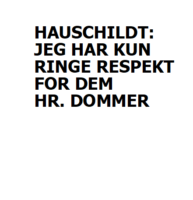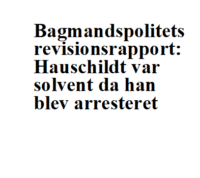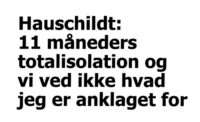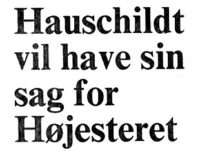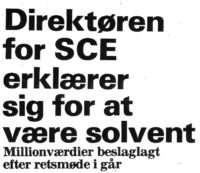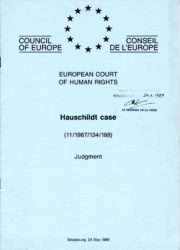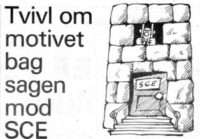Five Years of Continuous Harassment
Although the public got to know about my arrest, the closing of the companies and my solitary confinement on the television evening news, neither the public nor the media was ever told the truth about what went on for five years before that the Special Prosecution (Bagmandspolitiet) and the tax and fiscal Revenue stormed the SCE and arrested me for alleged tax evasion. In reading the article in Jyllands-Posten, Friday the 1st February 1980 (read the article in Danish), the day after my arrest the public was told that the Special Prosecution had been investigating the company since its start, five years earlier.
The Danish authorities had hunted the companies and I for close to five years before and they had tried everything including harassing me and the management of the companies on a daily basis, however, they were never able to do much with regards to the law, since we did nothing wrong or illegal. (See: The Real Background – Fiscal conspiracy)
Even prior to me starting SCE in Denmark, I had several meetings with senior people in the Ministry of Trade and the National Bank, in order to make sure that everything we did was legally correct and was within the law and within the various restrictions that Denmark imposed on our business, including with the strict exchange control.
We had staff that had close relatives working in the National Bank and we even employed a retired senior police officer to supervise the transport of our precious metals. I employed these people, well knowing that at least, I expected them to report back to their relatives and families that we did nothing wrong or against the law and that we only operated according to all the rules set out by the government and the National Bank.
We were blackmailed regularly by the Copenhagen Tax Authorities (Københavns Skattevæsen), who wanted access to the names of our clients and their transactions. On one occasion in 1979, they demanded that we pay tax there and then on all future income, despite losses in the previous year (we had handed over D.Kr. 200,000; otherwise the tax inspector would not leave our premises).
Making matters worse, we were regularly prevented by the National Bank from being able to hedge our currency and commodity transactions, creating considerable losses for the companies and at times, leaving business transaction as too risky to enter into.
The National Bank put pressure on our banking relationship and in one case, created a huge loss for us with Andelsbanken, one of the banks we used. None of these facts was ever reported in the Danish media.
The Illegal Wire Tapping
We were subjected to wiretapping (recording of telephone conversations) by the Danish authorities long before my arrest in January. In one conversation I had with a business contact in the US in January, just weeks before my arrest, I said that one of my companies would make at least 50 million-plus in 1980, making it valued on “the market” for up to 1 billion US Dollars. No doubt that my confidence of making “for sure” 50-100 million US Dollars in “the next few months” (said by me to a friend in London on the telephone a few days before my arrest), moved the Danish authorities and Bagmandspolitiet.
Especially as I had also pointed out that all of our Deferred Delivery Contracts in silver and platinum had a minimum of a three-month possible delivery clause; a strong legal agreement with our clients who had agreed to enter into when buying on margin.
This, together with the fact that I was absolutely certain that the precious metal price would crash due to the action by the Commodity Exchanges in New York and Chicago, must have aggravated the Danish authorities whilst listening to my telephone conversation.
The Special Prosecution also knew that the company would be calling some of the clients to make “margin calls” amounting to close to ten million Kroner, on the day the stormed my head office and arrested me at home.
Our Force Majeure Clause
I had also been telling various people, including on the phone, that if panic ever broke out or the Danish revenue would go further in their threat to close “The Capitalist Cave” as Christen Amby had stated to me and members of the staff, we had a so-called Force Majeure clause in our Differed Delivery Contract, all signed by our clients.
This Force Majeure clause (French for “superior force”) allowed us to suspend or terminate the performance of our obligations when certain circumstances beyond our control arise, making performance inadvisable, commercially impracticable, illegal, or impossible. The provision stated that the contract is temporarily suspended, or that it is terminated if the event of force majeure continues for a prescribed period of time.
A typical list of force majeure events might include war, riots, fire, flood, hurricane, typhoon, earthquake, lightning, explosion, strikes, lockouts, slowdowns, prolonged shortage of energy supplies, and acts of state or governmental action prohibiting or impeding any party from performing its respective obligations under the contract. This allowed us as the seller planning to ship its goods through that port would not be liable for late delivery of the goods.
So even with the Bagmandspolitiet’s action and my arrest, the companies were in a position to continue and carry on our business. But again, the Danish authorities, with Bagmandspolitiet knew this and made sure that staff was not allowed to go back to work.
Further preventing me to bring 15-18 million to Denmark, if I was free, something, I told the Commercial Court only days after my arrest. This money, never came to Denmark, partly, because other countries could see it was a politically motivated case.
The Danish Public and Most Clients was Fooled and Lied to
The Danish public and many clients of Scandinavian Capital Exchange was fooled and lied to by Bagmandspolitiet and the Danish media. Fooled by the misinformation, malicious lies and innuendoes put out by the prosecution in the press.
Bagmandspolitiet took maximum advantage of spreading allegations according to some clients’ who were so disgusted with the prosecution’s method; unfortunately, these clients’ voices hardly showed up in the media.
Every client was telephoned and given a “story” by Bagmandspolitiet. If they reacted as the prosecution hoped, they were invited to a meeting where the objective was to criminalise all their dealings with the companies in order to later appear as “good witnesses” in court. Perhaps these clients also expected a special treatment with regards to their investment. Other clients had pressure from the fiscal authorities to weaken them up so as to assist the prosecution in their pursuit of injustice.
During the years that the companies operated (1974 – 1980), Denmark had currency restriction and therefore Danish investors could not invest or take part in the speculation on the stock and commodity exchanges in London, New York and Chicago.
SCE introduced, for the first time to Danish and Scandinavian investors, the opportunity to buy precious metals, gold, silver, platinum and palladium (see Børsen).
During the years 1974 – 1978, the company sold platinum, palladium and silver bars over the counter, in addition to bullion coins (gold coins like the Kruger Rand). We were preparing for dealings in other financial instruments, as soon as the exchange control was lifted.
The company advocated investors to diversify their investment, so they invested 10-15% of their money in the precious metal as an insurance against inflation and stock markets crash.
Thousands of investors took our advice and purchased (through the years 1974 – 1980), gold, platinum, palladium and silver in bars and took delivery themselves. Also, many investors purchased gold coins for cash over the counter, which the company had advocated for years. Investors who did buy at the time had to wait many years, but today they can look back on investment with good profits of up to 600 – 1200%. I hope that the many investors who took our advice enjoy the profit today. Those investors who took our advice to buy palladium, have seen the largest profits.
Since I had expected the Danish currency restriction to be lifted, at least some years after Denmark’s membership of the EU, allowing Danish investors to invest and speculate on the overseas stock and commodity exchanges, I somewhat became concerned in 1978 when Denmark still did not allow a Dane to take more than D.Kr.5,000 abroad. Moreover, despite the EEC (EU) membership, Danes were still very restricted in what they could do with regards to investment abroad. The restrictions were even worse in Sweden and Norway.
Most Scandinavian investors were rather unsophisticated with regards to the financial market in general, but particularly the international market. Some of our investors wanted us to create a product which reflected the margin contracts used on the various commodity exchanges abroad, also something which could be used as a currency hedge against the Danish Kroner. This led me to design a way for investors where they could participate “indirectly” in the precious metal market and speculate on margin, with the view of not taking delivery.
We designed a special “Deferred Delivery Contract” which allowed investors to buy silver, platinum and palladium with only a 10-30% deposit. And since we did offer the option of delivery, they could finance the remainder of the purchase and have the advantage of tax relief on the interest payment. In reality, most of our clients did not want delivery; however, we had to leave this option open in our contract since this allowed investors to take advantage of the interest tax relief.
The Facts as to the Harassment
To quote from my submission to the European Commission of Human Rights:
The Danish authorities were responsible for the following acts prior
to the 31st January l980:
1. Preventing the companies to increase their capital despite
their under capitalization. I proposed to increase the paid up capital in SCE A/S from one million to five, from abroad. This was not allowed.
2. Inciting customers of SCE, who did not themselves
consider that they had any serious grievance with the
companies.
3. Creating false rumours about the companies and change
the real facts, providing misinformation and more e.g. reediting an article in a financial magazine.
4. Blackmailing the companies into providing information, as
to its customers, by the use of threats.
5. Creating deliberate fictitious charges against the
companies, in order to tie up executive time and staff. An
excessive amount of information and documentation was
requested by the authorities.
6. Forcing payment of taxation on estimated profitability,
which could not be evident in view of the audited accounts.
7. Putting pressure on clients of the companies, by
threatening the clients with various investigations, unless
they collaborated.
8. Paying the companies abnormally frequent control visits
and thereby putting undue pressure on their staff.
9. Delaying the processing of applications etc.
10. Arranging agent provocateurs.All the above mentioned acts, can be proven, however there are
many other negative means which have been used against the
companies, their customers and owner, which has not been
mentioned, due to documentation and proof. SCE had several
employees which had extensive background in banking and stock
brokering in Denmark, even held major executive positions in the
banking field, all these employees has complained, as to the
considerable amount of work connected to the authorities’
harassment of the companies during the years.
The Danish Revenue (Skattevæsen)
The Danish revenue was concerned with regards to possible investment with so-called “black money” and unregistered cash. Such activity would be reluctantly accepted if it was only relatively small amounts; however, in view of the substantial investments in 1979/80, this became a larger “problem” as such. In addition to this, since there was no precedence or effective rule, certain conditions were not evident.
Because EU considered precious metals and coins as goods and in Denmark, goods were subject to sales tax (MOMS), it was not a requirement by Danish law that clients had to show any documentation or be registered when buying precious metal “over the counter”. Therefore, the fiscal authorities had no record of these peoples names.
The companies were subject to many visits by the Copenhagen Tax office, including by the deputy chief of this office, Christen Amby (see: “The Red Tax Troll” )
They regularly harassed the companies and tried to “blackmail” the companies (and me) to inform on clients and people who purchased metals and coins over the counter – and then just took them home.
The Customs and Excise Office was responsible for the value-added tax on goods.
When SCE was a small company, the Customs and Excise Office agreed to permit that the sales tax/value-added tax (MOMS) could be refunded when the customers sold their goods. With regards to the deferred deliveries of the goods where most clients did not want delivery, and thereby in most cases – no import; therefore purchase tax on import was not possible.
No doubt, these matters did concern the Customs and Excise Office; they saw the amounts growing larger into millions of Kroner.
The National Bank’s (Nationalbanken) Involvement
From the first day of SCE operation in 1974, the Danish National Bank and the Ministry of Trade had been closely monitoring the companies’ activities. They had different concerns, which partly reflected Denmark’s new membership of the EEC (EU). The bank was concerned with the possible outflow of capital from Denmark, which in effect was difficult to control since there were no rules or regulations which could prevent investments in commodities.
The Ministry of Trade was directly in charge of a number of government agencies and institutions, which all have various interests which may conflict with some of the activities of SCE. The fact remains that the Ministry was very negative towards SCE and its activities from the first day.
Through all the years, not a month went by without SCE being contacted by these departments. I personally had, during the five to six years, so many meetings with senior people in the National Bank and the Ministry to explain and to find out what these civil servants had in mind. The new membership in the EU at the time did bring up more openness in trade and capital movement, which no doubt did concern a lot of civil servants. That these institutions conspired against the companies became clear in 1978.
An important financial magazine wanted to write about SCE’s deferred delivery contract. I personally confirmed the content of the article to the journalist at the magazine in July 1978. In September 1978 Finans/Invest published the article on SCE and the deferred delivery contract; however, the article had been changed and re-written by members of the magazine’s editorial staff.
SCE immediately made a strong protest against these changes since it appeared that SCE had tried to circumvent the Danish exchange control regulation and make large profits in its internal business procedure.
After contact with the owners of Finans/Invest, we received information that this article had been “re-written by a senior member of the National Bank, Mr Fleming Farup Madsen”. Mr Farup Madsen was also a member of the editorial staff of the magazine, where he or another person effectively had changed the article before it was printed, in blatant terms against the truth and the interest of SCE. Since the article had already been published, it was too late for SCE to do much about it.
According to documentation (an internal memorandum) which came to light during the case against me, a meeting was held in the National Bank in May 1979 which concluded that it has not been possible to find customers of SCE which would complain of any wrongdoing with regards to the companies and its owner (me). The investigation by the Bagmandspolitiet has not been “successful” and no person has been defrauded in any way. However, the National Bank wanted to still go ahead with the possible violations of the exchange control.
A Few Words from My Defence Attorney
Folmer Reindel, my defence attorney, came to me in June 1983, after having had several meetings in the High Court, without me. He looked serious and said to me:
“You already know that in a few weeks’ time you have served the seven-year sentence from the City Court; you know that Bagmandspolitiet offered you freedom if you withdrew your appeal back in March four months ago. Now we know that Bagmandspolitiet will ask for a twelve-year sentence in the High Court; we also know that at least two of the judges, including the presiding Judge Brink, have already expressed a strong bias against you in private and it will be these judges who will influence the lay-judges. Therefore, I ask you please to consider withdrawing the appeal, for yourself and your family. I know you are innocent, but this is not about justice, but power and cover-up. Bagmandspolitiet will not be allowed to fail in the eye of the public – the authorities simply have too much to lose.”
He continued: “You yourself have witnessed the so-called trial in the City Court, it was just a pantomime to justify the abuse of power. Neither Korsø-Jensen (my other defence lawyer) nor I could do anything about it. Now, in the High Court we are again restricted with regards to money and therefore the time we can work on your defence. We are not paid much and neither Korsø nor I can work without payments, therefore we are unable to work on the case apart from the meetings in the court. With a twelve-year sentence, you will be in prison for another two and a half years, although it will be in an open prison, it still means that you are not a free man for years to come.”
My answer he knew – I had to go ahead with the High Court case, despite that I could walk out immediately as a free man.
From the first day of the High Court proceedings, the tabloid press took a stand with regards to my continued pre-trial detention and indeed printed that the High Court judges had already shown that they would give me a bigger sentence than judged in the lower court. It went as far as editorial comments to this fact in BT and Ekstra Bladet.
Bagmandspolitiet even argued in the media (see example headlines here on the left), that I should not be released because I would leave Denmark and made reference to another case. What hypocrisy considering that six months before they had offered me an immediate release if I withdrew my appeal to the High Court.
One of the Many Proven Conspiracies and Important Facts
The Danish Authorities with the Special Prosecution deliberately prevented me from having the most important complaint to the European of Human Rights dealt with by keeping correspondence from me for years.
Two weeks after I started my hunger strike on August 1980, I sent my initial application to the European Council (dated the 26th August 1980). According to the European Convention of Human Rights – all prisoners should have free access to correspondence with the ECHR, this correspondence must never be opened or subject to censorship.
Despite this was clear and known to everyone, Bagmandspolitiet acted contemptuous to all aspect of the European Convention of Human Rights and just took the replies addressed to me (only) from the European Commission of Human Rights.
The ECHR replied already on the 3rd September 1980, this reply Bagmandspolitiet took in hand and first after two years and nearly three months was more or less forced to hand over to me, since I in the meantime had written to the Council of Europe and they informed me about this reply through my defence lawyer Folmer Reindel.
So at a time I was on hunger-strike, using my own body as a last protest and in fact still had more than five weeks to go of the hunger strike, Bagmandspolitiet conspired and kept the reply from the Council of Europe. This reply at the time truly would have given me some strength since my complaint related to the atrocious treatment I had been subject to ranging from solitary confinement, refusal of having access to a psychiatrist, restrictive visit by my family and already than trial by the media.I can’t emphasize enough today looking back how important this reply was for me at the time. This really did cause me considerable grief; at a time I found everything so hopeless after nearly nine month in solitary confinement and on hunger strike and not even receiving an answer from the European Council was bad.
It would have meant so much to me at the time to have known that the ECHR had answered my complaint and application in Strasbourg.
Having been subjected to horrendous treatment in my home country and given up nearly all hopes I did not even have recognition to my complaint to the European Council.
After two years I send another communication to Strasbourg “My Proclamation of 1000 in restrictive pre-trial detention without Judgement”. The reply dated the 9th November 1982 to my letter and contends was also taken by the Special Prosecution and kept away from me for nine days.
However, the European Commission informed me that they had sent me a reply more than two years earlier, Bagmandspolitiet was forced to hand over this reply more than two years and three months later which they did on the 18th November 1982. They just laughed and told me and my defence that they had forgotten to do this as it was NOT IMPORTANT.
Considering that I on so many occasions had told Bagmandspolitiet and the City Court that one day they would face justice in Strasbourg, every time to be received with laughter from the prosecution and the judge (and indeed any media), little did I know that they all this time had kept important correspondence away from me. Correspondence that I had free rights to! A most serious breach of the European Convention of Human Rights.
What is so important to understand is the fact that Bagmandspolitiet took this correspondence prevented me from attending to all the formalities as to the complaint of my treatment and the many contraventions I alleged as to the European Convention of Human Rights. Bagmandspolitiet knew this because they could read the required procedure to make a complaint to the European Council. In other words, the Danish authorities with Bagmandspolitiet deliberately kept me away from having the European Court of Human Rights dealing with the most serious and worst complains as to my case.
It went on Bagmandspolitiet open and kept the next correspondence from Strasbourg, this is after being told again and again by my defence that I have the right to unopened, unseen and uncensored communication with Strasbourg.
A letter received on the 13th December 1982 was first handed to me nearly three months letter on the 15th February 1983. I was told of the letter existence on the 22nd December 1982 but objected to that the letter had been open and kept for two weeks by the prosecution.
So even after being found out, Bagmandspolitiet continued their contemptuous behaviours – as they thought they could walk on water and get away with everything totally ignoring international conventions including the European Convention of Human Rights.
Members from Bagmandspolitiet even used to tell me that I will never get the European Commission of Human Rights to deal with my treatment, at the time I had no idea that they had stopped this by keeping important letters away from me.
Neither advocates Jørgen Jacobsen nor advocate Folmer Reindel believed that the Danish authorities would go so far to hide the treatment I was subjected to by stopping correspondence with the European Council. But as Folmer said after worth “now I truly know what scam bags are”. I used to call Bagmandspolitiet “low life” and “scam bags”.
Please see the long list of complaints sent to the ECHR (see: My Application to European Commission of Human Rights), most of these could not be dealt with by the Court as they were outdated after my initial application in August 1980. You can’t make two applications with the same complaints.
As I mentioned before the above-mentioned action by the Special Prosecution characterises their whole attitude by the Danish authorities to me and justice in general at the time.
As my defence lawyer Folmer Reindel said to me when Bagmandspolitiet came with the letter two years two months later, “if anyone had told me two years ago that the Danish authorities would conspire and prevent someone in making an application to the European Court of Human Rights, I would not believe this, but after nearly two years with your case, I am not surprised any longer.”
Since I could not trust that letters would not be taken and kept by the Danish authorities with Bagmandspolitiet I asked my lawyer Folmer Reindel to communicate with the European Commission directly for a long period.
When the European Court of Human Rights dealt with my complaints in 1983 onwards they could only deal with the issue of a fair trial and we could never bring up the issues related to my treatment.
When I was able to submit my second petition to the ECHR, after nearly 3 years in pre-trial detention, I considered Denmark’s breach of the Article 1, 3, 5, 6, and 10 of the European Convention of Human Rights far more important than making a complaint as to the breach of Article 8. So despite the Danish authorities had taken my correspondence with the ECHR and kept it for two years and two months away from me, preventing me to submit my complaint as to my appalling treatment, I did not bother to submit a petition for this misdemeanour by the Danish state.
Article 8 protects even the prisoner’s right to privacy with medical correspondence with their doctors. Article 8 gives prisoners the right to access to doctors, as the person was not in prison. Considering that was refused permission to see a doctor for more than four years, I even did not make a petition as to this. I was only allowed to see prison doctors (all corrupted in their duties for the state at the time), moreover, when I after nearly four years received permission to see a doctor they would not allow a private visit without members from the prosecution was in attendance!
Article 8 in the European Convention of Human Rights providing free access to the European Council and the European Court of Human Rights, generally it deals with the following issues:
Article 8 – Right to respect for private and family life
1. Everyone has the right to respect for his private and family life, his home and his correspondence.
2. There shall be no interference by a public authority with the exercise of this right except such as is in accordance with the law and is necessary in a democratic society in the interests of national security, public safety or the economic well-being of the country, for the prevention of disorder or crime, for the protection of health or morals, or for the protection of the rights and freedoms of others.
Important Facts
- Until my arrest “for alleged serious tax evasion” and the closing of the companies, the companies had fulfilled all of their obligations to their clients and were not involved in any unlawful activity.
- Until my arrest, the companies were not involved with any litigation or any form of dispute with clients.
- All disputes reported in the media came after the closing of the companies, my arrest and the media publicity. The fact remains that the companies had no legal dispute with any client as per 31st January 1980.
- The companies had no liquidity problems in January 1980 – Most of the companies and my personal liquid assets were in London, not in Switzerland or some remote offshore place hidden in a bank.
- I have never seen the original warrant for alleged serious tax evasion and what documentation was used to convince the court and justify the issue of such a warrant.
- I had never been contacted before with regards to these allegations of serious tax evasion, nor had my accountant or lawyers.
- I hold the Danish “record” for being kept in pre-trial detention – 1492 days, at least in the last 300 years.
- I never was a prisoner according to the Danish Prison Service (Kriminalforsorgen) – “only” a person kept on remand for 1492 days. Never serving a sentence.
- An internal memorandum from the National Bank in May 1979 showed that the National Bank had been told by the police that it was impossible to make a case against the companies and me since all clients were satisfied with the company and not willing to complain about anything.
- An internal memo by the Copenhagen Tax Office in October 1979 concluded again that the National Bank and the fiscal authority were unable to find any clients who would complain against the companies. Moreover, this memo confirmed that the standard business terms used by the companies did not require SCE to buy or hedge the margin sales. SCE had no obligation to hedge the sales of precious metal on the terminal contracts – deferred sales. The memo further confirmed that most investors did not want their silver delivered, but just liquidated their contracts with SCE.
- I was solvent at the time of my arrest when I was declared bankrupt by a Commercial Court (even the Prosecution’s expensive auditors confirmed this).
- I was declared bankrupt by the Commercial Court, not having proper access to the seized material with Bagmandspolitiet and despite having most of my assets outside Denmark. Moreover, most of these assets outside of Denmark I was allowed to keep.
- I offered the Commercial Court, in February 1980 shortly after my arrest, to bring all my liquid assets, approx 16-20 million, to Denmark if I was immediately released in order to run the companies and attend to my affairs.
- The dates selected for making the balances for the estate of the bankruptcies’ was entirely arbitrary so as to give Bagmandspolitiet the best scenario for later making a case against me. Moreover, preventing the registration of SCE A/S did “save” a lot of people from possible bankruptcy as they owed the company money.
- I have never seen the accounts of the estates from the appointed liquidators’ advocates Bent Jespersen and Egon Høgh. What happened to the assets of the companies and my personal assets, my family’s art collection, antiques and valuables?
- I never had contact with any criminal elements in Danish society before the events accept the “criminals” among the authorities.
- I never had any plans to run away to South America – all stories planted by the Special Prosecution.
- I never served a criminal sentence anywhere, neither before or after the events in Denmark. The Danish Prison Service told me that I never served a sentence and was only kept on remand for 1492 days.
- How crazy the Danish bankruptcies were, the liquidator later handed my attorney Folmer Reindel in 1986 a collection of 99 gold coins to give me (worth today US$110,000), since these were “my personal coins”. I was not allowed many other personal gold coins and collections including my many Miro pictures and my banknote collection. Nevertheless, the fact remains that I was allowed to keep many valuables, which I was thankful for to the liquidators, but this makes a mockery of the Danish bankruptcy laws and procedures. I was able to keep my Rolex gold watch on my wrist, from the day of my arrest until my freedom 1492 days later. The watch, which is still in my procession and now valued in excess of 350,000 D.Kr.
- As to the Danish bankruptcies and how they could make me personally bankrupt, without any documentation, despite I personally offered to bring 14-16 million D.Kr. of my own money to Denmark, which they refused. As I was the unlimited partner in M. Hauschildt et Cie in Zurich, worth at the time in excess of 6 million Swiss Francs – how could I be bankrupt?
- The Danish media could write more than one thousand five hundred newspaper and magazine articles, broadcast radio and television programs about my case and the event, but not bother being present at the European Court of Human Rights when the full Court of 17 judges from all the member countries considered the case. A case which ended in a Judgement against Denmark. Denmark, stood accused and later judged for the first time in nearly forty years earlier since the Court was established. Whereas the French, German, Belgian and Dutch television was there, none from the Danish or Scandinavian media bothered.
- The Danish authorities with Bagmandspolitiet was total contemptuous of the European Convention of Human Rights and took my correspondence with the ECHR and kept it away from me for years preventing me my legal rights to free communication with the Commission, moreover that I could ever have the Court to deal with my complaints about my treatment and the conspiracy
- The Danish authorities did not pay the money due from the compensation Judgement of the Court of Human Rights (ECHR) since they claimed I owed money to pay for the trial – a trial which the ECHR judged to be unfair and confirmed was a breach of the Convention Article 6 – A Fair Trial
- Yes, justice is an illusion!


